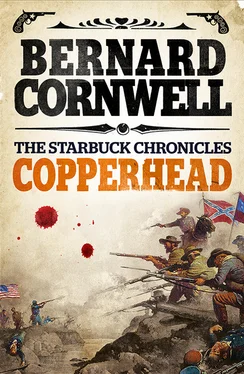But if the choice of crossing place was obscure, at least the night’s purpose was clear. The expedition would climb the Virginia bluffs to attack the rebel camp and capture as many Confederates as possible. Some rebels would get away, but those fugitives would find their flight blocked by a second Yankee force that was crossing the river five miles downstream. That force would cut the turnpike that led from Leesburg to the rebel headquarters at Centreville, and by trapping the defeated rebel forces it would provide the North with a small but significant victory to prove that the Army of the Potomac could do more than just drill and train and mount impressive parades. The capture of Leesburg would be a welcome bonus, but the night’s real purpose was to prove that the newly trained Army of the Potomac was ready and able to whip the rebels ragged.
To which end the small boats struggled back and forth in the mist. Each crossing seemed to take forever, and to the impatient men on the Maryland shore the waiting files seemed to get no shorter. The 15th Massachusetts was crossing first, and some men in the 20th Massachusetts feared that their sister regiment would capture the enemy camp long before the few boats succeeded in ferrying the 20th across the river. Everything seemed so slow and clumsy. Rifle butts clattered on gunwales and bayonet scabbards snagged themselves on the bushes at the water’s edge as the men clambered into the row boats. At two in the morning a larger boat was discovered upstream and brought down to the crossing place, where it was greeted with an ironic cheer. It seemed to Lieutenant Holmes that the waiting men were making a lot of noise, enough surely to alert any rebels who might be guarding the Virginia bank, but no challenge sounded through the mist and no rifle shots echoed from the high wooded slope that loomed so ominously beyond the island. “Does the island have a name?” Lieutenant Holmes asked the Major who had spoken so wistfully of Christmas.
“Harrison’s Island, I think. Yes, Harrison’s.”
It sounded an undramatic name to Lieutenant Holmes. He would have preferred something nobler to have marked the 20th Massachusetts’s baptism of fire. Maybe a name with the iron ring of Valley Forge, or the simple nobility of Yorktown. Something that would ring through history and look fine when it was embroidered on the regiment’s battle flag. Harrison’s Island sounded much too prosaic. “And the hill beyond it?” he asked hopefully. “On the far bank?”
“That’s called Ball’s Bluff,” the Major said, and that was even less heroic. The battle of Ball’s Bluff sounded like a poker game rather than the signal event that would mark the resurgence of northern arms.
Holmes waited with his company. They would be the first of the 20th Massachusetts to cross and so the likeliest of their regiment to be in a fight if the 15th had not already captured the encampment. That possibility of battle made the men nervous. None of them had fought before, though all had heard tales of the battle fought at Bull Run three months before and how the ragged gray-clad rebel ranks had somehow clung together long enough to drive the larger Federal army into panicked retreat, but none of the 20th Massachusetts believed they would suffer a similar fate. They were superbly equipped, well-trained, led by a professional soldier, and confident they could outfight any rebel born. There would be danger, of course—they expected and even wanted some danger—but the night’s work would be crowned with victory.
One of the boats coming back from Harrison’s Island brought a captain of the 15th Massachusetts who had crossed with the very first troops and who now returned to report to the commanding officers of the waiting regiments. The Captain slipped as he jumped from the boat’s bows and would have fallen if Lieutenant Holmes had not reached out a steadying hand. “All quiet on the Potomac?” Holmes asked jocularly.
“All’s quiet, Wendell.” The Captain sounded disappointed. “Too quiet. There’s not even an enemy encampment up there.”
“No tents?” Lieutenant Holmes asked in surprise. “Truly?” And he hoped his voice sounded properly disappointed as befitted a warrior denied a chance of battle, and in part he was disappointed because he had been looking forward to the excitement, but he was also aware of a shameful relief that perhaps no enemy waited on the far bluff.
The Captain straightened his coat. “God knows what that patrol thought they saw last night, but we can’t find anything.” He walked away with his news while Lieutenant Holmes passed the word on to his company. There was no enemy waiting across the river, which meant the expedition would most probably march on to occupy Leesburg. A sergeant wanted to know if there were any rebel troops in Leesburg and Holmes had to confess he did not know, but the Major, overhearing the conversation, volunteered that at best there would be only a handful of the Virginia Militia probably armed with the same guns with which their grandfathers had fought the British. The Major went on to say that their new task would be to capture the harvest that would have been newly gathered into the barns and storerooms of Leesburg, and that while such supplies were a legitimate military target, other private property should be respected. “We’re not here to make war on the homes of women and children,” the Major said sternly. “We must show the seceshers that northern troops are their friends.”
“Amen,” the Sergeant said. He was a lay preacher who was trying to rid the regiment of the sins of card-playing, liquor, and womanizing.
The last of the 15th Massachusetts crossed to the island and Holmes’s gray-coated men shuffled down the bank to wait their turn in the boats. There was a feeling of disappointment among the men. They had anticipated a whooping hunt through the woods, but instead it seemed they would merely be disarming a town’s old men of muskets.
In the shadows of the Virginia bank a fox pounced and a rabbit died. The beast’s cry was sudden and shrill, gone almost as soon as it had begun, to leave nothing behind but the scent of blood and the echo of death in the dark, sleeping, and unsuspecting woods.
Captain Nathaniel Starbuck reached his regiment’s campsite at three in the morning. It was a clear night, star-bright and moonlit, with just a hint of mist showing in the hollows. He had walked from Leesburg and was dog-tired by the time he reached the field where the Legion’s tents and shelters were lined in four neat rows. A sentry from C Company nodded companionably at the young black-haired officer. “Hear the rabbit, Captain?”
“Willis? You’re Willis, right?” Starbuck asked.
“Bob Willis.”
“Aren’t you supposed to challenge me, Bob Willis? Aren’t you supposed to level your rifle, demand the password, and shoot me dead if I get it wrong?”
“I know who you are, Captain.” Willis grinned in the moonlight.
“The way I feel, Willis, you would have done me a favor by shooting me. What did the rabbit say to you?”
“Shrieked like he was dying, Captain. Reckon a fox got him.”
Starbuck shuddered at the relish in the sentry’s voice. “Good night, Willis, and may sweet angels sing thee to thy rest.” Starbuck walked on between the remnants of the night’s fires and the handful of Sibley tents where a few men of the Faulconer Legion slept. Most of the regiment’s tents had been lost in the chaos of the Manassas battlefield, so now the majority of the regiment slept either in the open air or in neat shelters made of branches and sod. A fire flickered among the shelters of Starbuck’s K Company and a man looked up as Starbuck approached.
“Sober?” the man asked.
“Sergeant Truslow is awake,” Starbuck declaimed. “Do you never sleep, Truslow? I am perfectly sober. Sober as a preacher, in fact.”
Читать дальше












